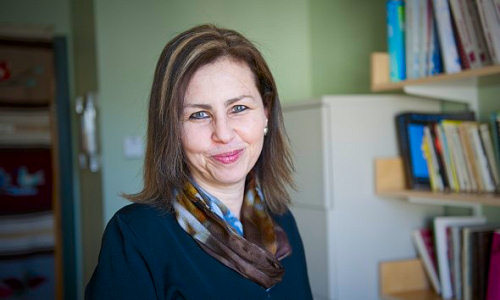A groundbreaking study published in PLOS ONE by Prof. Iris Berent of Northeastern University and researchers at Harvard Medical School shows the brains of individual speakers are sensitive to language universals. Syllables that are frequent across languages are recognized more readily than infrequent syllables. Simply put, this study shows that language universals are hardwired in the human brain.
Prof. Iris Berent, professor of psychology at Northeastern University. Photo Credit: Northeastern University
LANGUAGE UNIVERSALS
Language universals have been the subject of intense research, but their basis remains elusive. Indeed, the similarities between human languages could result from a host of reasons that are tangential to the language system itself. Syllables like lbog, for instance, might be rare due to sheer historical forces, or because they are just harder to hear and articulate. A more interesting possibility, however, is that these facts could stem from the biology of the language system. Could the unpopularity of lbogs result from universal linguistic principles that are active in every human brain?
THE EXPERIMENT
To address this question, Dr. Berent and her colleagues examined the response of human brains to distinct syllable types—either ones that are frequent across languages (e.g., blif, bnif), or infrequent (e.g., bdif, lbif). In the experiment, participants heard one auditory stimulus at a time (e.g., lbif), and were then asked to determine whether the stimulus includes one syllable or two while their brain was simultaneously imaged.
Results showed the syllables that were infrequent and ill-formed, as determined by their linguistic structure, were harder for people to process. Remarkably, a similar pattern emerged in participants’ brain responses: worse-formed syllables (e.g., lbif) exerted different demands on the brain than syllables that are well-formed (e.g., blif).
UNIVERSALLY HARDWIRED BRAINS
The localization of these patterns in the brain further sheds light on their origin. If the difficulty in processing syllables like lbif were solely due to unfamiliarity, failure in their acoustic processing, and articulation, then such syllables are expected to only exact cost on regions of the brain associated with memory for familiar words, audition, and motor control. In contrast, if the dislike of lbif reflects its linguistic structure, then the syllable hierarchy is expected to engage traditional language areas in the brain.
While syllables like lbif did, in fact, tax auditory brain areas, they exerted no measurable costs with respect to either articulation or lexical processing. Instead, it was Broca’s area—a primary language center of the brain—that was sensitive to the syllable hierarchy.
These results show for the first time that the brains of individual speakers are sensitive to language universals: the brain responds differently to syllables that are frequent across languages (e.g., bnif) relative to syllables that are infrequent (e.g., lbif). This is a remarkable finding given that participants (English speakers) have never encountered most of those syllables before, and it shows that language universals are encoded in human brains.
The fact that the brain activity engaged Broca’s area—a traditional language area—suggests that this brain response might be due to a linguistic principle. This result opens up the possibility that human brains share common linguistic restrictions on the sound pattern of language.
FURTHER EVIDENCE
This proposal is further supported by a second study that recently appeared in the Proceedings of the National Academy of Science, also co-authored by Dr. Berent. This study shows that, like their adult counterparts, newborns are sensitive to the universal syllable hierarchy.
The findings from newborns are particularly striking because they have little to no experience with any such syllable. Together, these results demonstrate that the sound patterns of human language reflect shared linguistic constraints that are hardwired in the human brain already at birth.
Story Source:
The above story is based on materials provided by Northeastern University College of Science.





